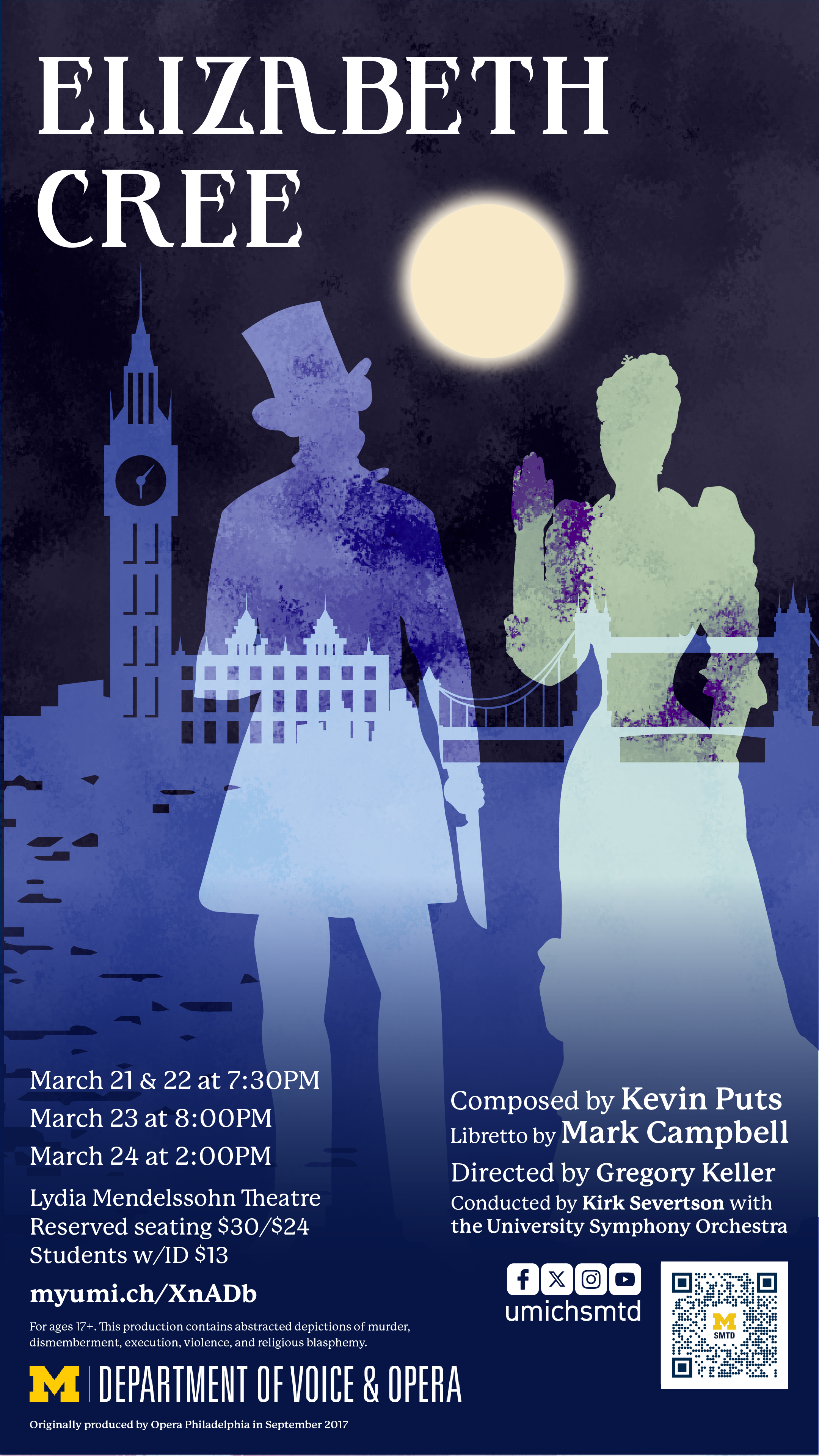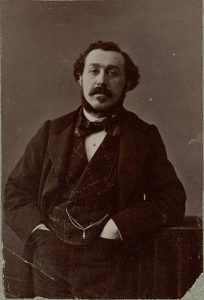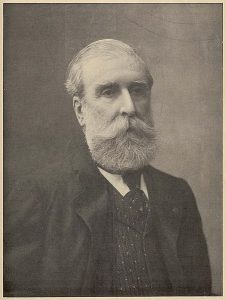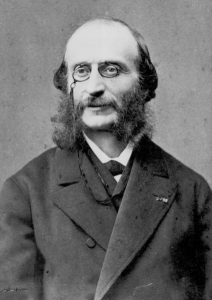Performance Programs

Creative Team
Conductor
Kirk Severtson
Director
Gregory Keller+
Assistant Conductor
Nicholas Bromilow‡*
Scenic Designer
Audrey Tieman‡
Costume Designer
Christianne Myers
Lighting Designer
Abi Farnsworth‡
Hair and Makeup Designer
Brittany Crinson
Dialect Coach
Jeremy Sortore
Diction Coach
Timothy Cheek
Resident Intimacy Choreographer and Cultural Consultant
Raja Benz
Resident Dramaturg
Karin Waidley
Rehearsal Pianists & Vocal Coaches
John Morefield‡, Muse Ye‡
Production Stage Manager
Kayleigh Laymon+
Cast
Thursday/Saturday
Elizabeth Cree
Aria Minasian
John Cree
Robert Wesley Mason
Aveline Mortimer/Witness #1
Katelyn Brown
Friday/Sunday
Elizabeth Cree
Danielle Casòs
John Cree
Jack Morin
Aveline Mortimer/Witness #1
Juliet Schlefer
All Performances
Dan Leno
Alexander Nick
Uncle/Witness #9
Thomas Long
Inspector Kildare/Witness #7/Executioner
Tyler Middleton
Doris/Witness #3
Daiyao Zhong
Little Victor Farrell/Witness #4
Jabari Lewis
Mr. Greatorex/George Gissing/Etcher/Witness #6
Cody Carlson
Mr. Lister/Karl Marx/Voiceover/Witness #8
Loren Reash-Henz
Priest/Librarian/Witness #5
William Fishwick
Jane Quig/Annie the Serving Girl/Witness #2
Amelia Zhang
Shadow Play Performers
Mia Brooks, Joaquin Consuelos, Nate McCanna,
Elizabeth Nigg
Orchestra
Conductor
Kirk Severtson
Assistant Conductor
Nicholas Bromilow
Violin I
Allyson Cohen
Violin II
Caleb Frailey
Viola
Yifei Wang
Cello
Dayoung Park
Double Bass
Jack Reed
Flute
Chin-Fang Wu
Oboe
Lillian Matthews
Clarinet
Olivia Galante
Bassoon
Ella Hebrard
Trumpet
Clifton Little
Horn
Claire Marquardt
Bass Trombone
Evan Ling
Percussion
Austin Nordhaus,
Jonathan Wentzel
Harp
Ryley Busch
Keyboard
John Morefield, Muse Ye
Assistants to the Creative Team
Assistant Director Mirit Skeen
Assistant Hair & Makeup Designer Bridget Rzymski
Assistant Costume Designer Kayti Sanchez
Assistant Hair & Makeup Supervisor Sam Whetstone
Assistant Dramaturgs Shelby Alexander, Abigail Labbé
Production Crew
1st ASMs Briana Barker (Rehearsals), Andy Blatt
2nd ASMs Sammer Ali, Justin Comini, Banks Krause, Victoria Kvasnikov, Yuchen Ma
Charge Artist Ellie Vice
Sound Engineer Al Hurschman
Shop Crews
Theatrical Lighting Shira Baker, Abi Farnsworth, Sydney Geysbeek, Ethan Hoffman, Elianna Kruskal, Brandon Malin, Megan Mondek, Christian Mulville, Gabriela Ribeiro Znamensky, Kathleen Stanton-Sharpless, William Webster, Miles Zoellick
Painting Gilayah McIntosh, Bella Rowlison, Martha Sprout, Seri Stewart, Lauren Streng, Ellie Vice, Amber Walters, Angela Wu & Theatre 250/252/262 students
Props Eliza Anker, Danielle Bekas, Andy Blatt, Madysen Casey, Aquila Ewald, Dallas Fadul, Audrey Hollenbaugh, Lucy Knas, Teresa Morales, Charlotte Stallings, Audrey Tieman & Theatre 250/252 students
Scenery Marium Asghar, Juliet Bornholdt, Andy Blatt, Anna Forberg, Miles Hionis, Hannah Kryzhan, Michael Russell, Sophia Severance, Lauren Streng, Eliza Vassalo & Theatre 250/252/262 students
Costumes Maya Liu, Esmay Pricejones, Kaytlin Sanchez, Ellie Van Engen & Theatre 250/252/262 students
Production Office Briana Barker, Justin Comini, Estie Hwang
Running Crew
Light Board Operator Yuki Wu
Follow Spot Operators Sarah Lau, Daniel Simpson
Supertitles Operator Dorian Hall
Scenery Deck Crew Anastasia Bredikhina, Emerson Forbes, Amber Sosa
Props Crew Bella Detwiler, Mira Grayton, Ally Johnson
Wardrobe Crew Julia Lepore, Mila McCoy^, Eliza Vassalo, Emily Weddle
Hair and Makeup Crew Anna Forberg, Victoria Pinto
Flight Effect Captain Heather Udowitz
^=Crew Head
Design & Production Faculty Advisors
Head of Design & Production Christianne Myers
Stage Management Nancy Uffner
Scenic Design Jungah Han, Kevin Judge
Costume Design Christianne Myers, Sarah M. Oliver
Lighting Design Jess Fialko
Sound Design Henry Reynolds
Staff Mentors
Brittany Crinson, Heather Hunter, Chad Hain, Beth Sandemaier
Department of Voice
Chair
Scott Piper
Opera Faculty
Timothy Cheek, Kirk Severtson, Matthew Thompson, Mo Zhou
Voice Faculty
Freda Herseth, Stephen Lusmann, Caitlin Lynch, Amanda Majeski,
Rose Mannino, Stanford Olsen,
Scott Piper, George Shirley,
Louise Toppin, Daniel Washington, Stephen West
Associated Faculty
Antonio Cuyler, Caroline Helton
Distinguished Visiting Artist
Thomas Hampson
Professors Emeriti
Willis Patterson, Carmen Pelton, George Shirley
University Productions Administrative Staff
Executive Director
Jeffrey Kuras
Sr Administrative Specialist
Christine Eccleston
Sr Administrative Assistant
Nathan Carrillo
Information Systems Manager
Henry Reynolds
Facilities Manager
Shannon Rice
Performance Halls
House Manager
Kelley Krahn
Lead Backstage Operations Manager
Dane Racicot
Senior Backstage Operations Manager
David Pickell
Backstage Operations Managers
Tiff Crutchfield, Alex Gay, Yvette Kashmer, Robbie Kozub
University Productions Production Staff
Production Manager
Paul Hunter
Assistant Production Manager
Michelle Williams-Elias
Technical Director (Walgreen)
Richard W. Lindsay Jr.
Theatrical Scenery Manager
Chad Hain
Lead Scenic Carpenter
Devin Miller
Scenic Carpenter
Heather Udowitz
Charge Scenic Artist
Beth Sandmaier
Associate Theatrical Paint Manager
Madison Stinemetz
Theatrical Properties Manager
Patrick A. Drone
Associate Theatrical Properties Manager
Danielle Keys
Senior Properties Artisan
Dan Erickson
Visiting Theatrical Hair and Makeup Manager
Brittany Crinson
Theatrical Lighting Manager
Heather Hunter
Associate Theatrical Lighting Manager
Jorrey Calvo
Sound Designer/Engineer
Henry Reynolds
Costume Shop Manager
Laura Brinker
Assistant Costume Shop Manager
Leslie Ann Smith
Lead Cutter/Draper
Tj Williamson
Cutter/Drapers
Seth Gilbert, Sarah Havens
Stitcher
Rene Plante
Theatrical Stitcher
Marcia Grace
Lead Costume Crafts Artisan
Elizabeth Gunderson
Costume Stock Manager
Theresa Hartman
Wardrobe Manager
Rossella Human
Theatrical Properties Stock and Tech Coordinator
Katherine Kreutz
Resources
PROLOGUE, April 9, 1881; Camberwell Prison
Elizabeth Cree is hanged for the murder of her husband, John. As the noose tightens around her neck, Elizabeth utters an enigmatic phrase: “Here we are again.”
SCENE 1, January 1881; The Courtroom
Elizabeth stands on trial for murdering her husband. The prosecuting attorney inquires about her former life before she met and later married John Cree.
SCENE 2, September 1878; A Street in London
Elizabeth returns in memory to her youth when she was known as “Lambeth Marsh Lizzie” and lived in poverty with her abusive mother, mending sails for the fishermen on the Thames. After her mother dies, Elizabeth uses the collection the fishermen have raised to fulfill her dream of visiting the music hall. She runs across town to a theatre, buys a ticket, and goes inside.
SCENE 3, September 1878; The Music Hall, Onstage
Elizabeth watches a variety show, enthralled as the famous comedian Dan Leno performs a skit playing Bluebeard’s housekeeper.
SCENE 4, September 1878; The Music Hall, Backstage
Elizabeth slips backstage after the performance and meets Dan Leno, as well as others in his company: “Uncle” the Ventriloquist; Doris, the Goddess of Wire-Walking; Little Victor Farrell the Magician; and Aveline Mortimer the Wide-Eyed Warbler (who leaves soon after Elizabeth arrives). The performers, hearing of Elizabeth’s plight, quickly adopt her into their stage family.
SCENE 5, September 10, 1880; The Diary of John Cree
An entry in the diary of John Cree recounts the murder of a young prostitute named Jane Quig.
SCENE 6, September 12, 1880; An Office in Scotland Yard
Panic grips London after the murder of Quig, and Inspector Kildare of Scotland Yard is assigned to the case. Searching for clues, he learns that Quig occasionally swept the floors of the Reading Room in the British Museum, so he interrogates the noted novelist George Gissing, who does his writing there.
SCENE 7, February 1881; The Courtroom
At her trial, Elizabeth is questioned by the defense attorney. Elizabeth suggests that John took his own life, due to a “morbid disposition.” The prosecuting attorney implies that Elizabeth murdered John for his money and calls Aveline Mortimer to the stand.
SCENE 8, April 1878; The Music Hall, Backstage and On
After working for several months backstage with the troupe of actors, Elizabeth makes her stage debut, replacing an increasingly truant Aveline Mortimer. It is a great success. After her performance, John Cree, playwright and critic, goes backstage and introduces himself.
SCENE 9, September 12, 1880; The Diary of John Cree
Another entry in the diary of John Cree records the murder of Solomon Weil, a Hebrew scholar.
SCENE 10, September 14, 1880; An Office in Scotland Yard
Kildare interrogates Karl Marx, who was a colleague of Weil’s and also frequents the Reading Room. Meanwhile, public panic grows and the murderer is dubbed “The Limehouse Golem,” because of the geographic location of the crimes and because a Jewish man is the latest victim.
SCENE 11, February 1881; The Courtroom
At the trial, the prosecuting attorney interrogates Aveline Mortimer and raises the suspicion that Elizabeth killed John by poisoning him with a “physic” she concocted herself.
SCENE 12, November 1878; The Music Hall, Backstage and On
Elizabeth has risen to star status in the world of the music hall but grows bored with ingénue roles. She performs a song in male attire with Dan called “The Clever Cleaver Act.”
SCENE 13, September 15, 1880; The Diary of John Cree
An entry chronicles another brutal murder: that of the entire Gerrard family, slaughtered to commemorate the Marr family murders immortalized in Thomas De Quincey’s “On Murder As One of the Finer Arts.”
SCENE 14, September 26, 1880; An Office in Scotland Yard
Kildare seeks clues in the Gerrard family murders and questions Dan, as Mr. Gerrard once served as his dresser. After Dan leaves Scotland Yard, he quietly bemoans a world in which such evil exists. Meanwhile, the panic in London builds and Kildare feels more pressure to find the murderer.
SCENE 15, February 1881; The Courtroom
At the trial, Aveline raises stronger suspicions that Elizabeth murdered her husband.
SCENE 16, November 1879; The Music Hall, Backstage
After a performance, Uncle learns that Elizabeth is about to go on another date with John Cree. He accuses her of opportunism, mentioning that John is both a theatre critic and wealthy.
SCENE 17, November 1879; A Street in London, Under a Full Moon
John confesses his love for Elizabeth and proposes marriage. Elizabeth accepts.
SCENE 18, June 1880; The Music Hall, Backstage
At a marriage celebration, Dan toasts Lambeth Marsh Lizzie’s new life…as Mrs. John Cree.
SCENE 19, September 1880; The Home of John and Elizabeth Cree
John is frustrated that Elizabeth refuses to consummate their marriage. He leaves for the Reading Room at the British Museum. Elizabeth decides to engage Aveline as a maid to satiate John’s desires.
SCENE 20, September 1880; The Reading Room, the British Museum
In the Reading Room, John expresses despair about his marriage, while working on his new play, entitled Misery Junction. Karl Marx appears and requests a book from the librarian.
SCENE 21, September 1880; The Home of John and Elizabeth Cree
Aveline is engaged to work in the Cree household as a housekeeper. John meets and is instantly attracted to Aveline. He leaves, but returns and flirts with Aveline.
SCENE 22, September 1880; The Reading Room, the British Museum
John continues to voice his sorrow at his unhappy marriage while working on Misery Junction. He is joined in the Reading Room by Karl Marx, George Gissing, and Dan Leno.
SCENE 23, September 1880; The Home of John and Elizabeth Cree
Elizabeth tells Aveline that John suffers from mad dreams and orders her to give him a “physic” that she prepares herself every night.
SCENE 24, March 1881; The Courtroom
The two attorneys conclude their arguments in the trial of Elizabeth Cree.
SCENE 25, October 1880; The Reading Room, the British Museum
Marx, Gissing, and Leno continue to read their books, but John is absent from the Reading Room. Elizabeth returns three books to the librarian.
SCENE 26, November 1880; An Office in Scotland Yard
Kildare is dumbfounded that the Limehouse Golem’s murders have suddenly stopped and that the public now turns its fickle attention to the trial of Elizabeth Cree.
SCENE 27, March 1881; The Courtroom
Elizabeth is convicted of murdering John and sentenced to death.
SCENE 28, April 9, 1881. A Cell in Camberwell Prison/The Diary of John Cree
The Priest visits Elizabeth and hears her confession.
SCENE 29, September 1881; A Theatre
A year later, it’s opening night of John Cree’s play, now entitled The Crees of Misery Junction, which has been rewritten to capitalize on his murder and stars Aveline Mortimer (“The Woman Who Was There”) as Elizabeth Cree. Unfortunately, there is a calamitous scenic malfunction, prompting Dan to remark, “Here we are again.”
The performers in this production were students in the Department of Voice and the University Philharmonia Orchestra. The designers for this production were students, faculty, and/or guests of SMTD. Scenery, costumes, properties, sound, and lighting were realized by the students and staff of University Productions, the producing unit of the SMTD. Thank you for supporting our educational mission.
Licensing
By arrangement with Aperto Press, publisher; Bill Holab: Sole Music Agent
*Nicholas Bromilow will conduct the performance on Sunday, March 24th.
This production is dedicated to Professor Martin Katz in celebration of his retirement.
 Hector Crеmieux (Libretto, 1828–1892) was a French dramatist whose work was heavily inspired by the politics of his day. During the revolution of February 1848, he secured a commission as lieutenant of the Garde Mobile. The turbulent French political landscape he grew up around inspired Crémieux to adapt the history of [Giovanni Luigi] Fiesco, from the German of Friedrich Schiller, for the French stage. The emperor, solicitous to bestow political patronage upon those who had been daring enough to give him support in the risky affair of December 2, rewarded Crémieux in 1852 with a clerkship in the Ministry of State. This patronage enabled him to enter upon a literary career and to exploit the financial possibilities of the Parisian stage of the second empire. Crémieux had a long and illustrious theatrical career, but to this day his most famous work remains Orpheus in the Underworld. Sadly, Crémieux committed suicide in 1892.
Hector Crеmieux (Libretto, 1828–1892) was a French dramatist whose work was heavily inspired by the politics of his day. During the revolution of February 1848, he secured a commission as lieutenant of the Garde Mobile. The turbulent French political landscape he grew up around inspired Crémieux to adapt the history of [Giovanni Luigi] Fiesco, from the German of Friedrich Schiller, for the French stage. The emperor, solicitous to bestow political patronage upon those who had been daring enough to give him support in the risky affair of December 2, rewarded Crémieux in 1852 with a clerkship in the Ministry of State. This patronage enabled him to enter upon a literary career and to exploit the financial possibilities of the Parisian stage of the second empire. Crémieux had a long and illustrious theatrical career, but to this day his most famous work remains Orpheus in the Underworld. Sadly, Crémieux committed suicide in 1892.
—Bio excerpted from Jewish Encyclopedia
 Ludovic Halévy (Libretto, 1834–1908) was born in Paris. His uncle, Fromental Halévy, was a noted composer of opera; hence the double and early connection of Ludovic Halévy with the Parisian stage. In 1855, he became acquainted with the musician Offenbach. His first work was produced under the pseudonym of Jules Servières. The name of Ludovic Halévy appeared for the first time on the bills on January 1, 1856. Soon afterwards, the unprecedented run of Orpheus in the Underworld, written in collaboration with Hector Crémieux, made his name famous. Late in life, Halévy remained an assiduous frequenter of the Academy, the Conservatoire, the Comédie Française, and the Society of Dramatic Authors, but, when he died in Paris on 7 May 1908, he had produced practically nothing new for many years.
Ludovic Halévy (Libretto, 1834–1908) was born in Paris. His uncle, Fromental Halévy, was a noted composer of opera; hence the double and early connection of Ludovic Halévy with the Parisian stage. In 1855, he became acquainted with the musician Offenbach. His first work was produced under the pseudonym of Jules Servières. The name of Ludovic Halévy appeared for the first time on the bills on January 1, 1856. Soon afterwards, the unprecedented run of Orpheus in the Underworld, written in collaboration with Hector Crémieux, made his name famous. Late in life, Halévy remained an assiduous frequenter of the Academy, the Conservatoire, the Comédie Française, and the Society of Dramatic Authors, but, when he died in Paris on 7 May 1908, he had produced practically nothing new for many years.
—Bio excerpted from the Opera San Jose
 Jacques Offenbach (Composer, 1819–1880) is a French composer of German origins (he became a naturalized French citizen in 1860) who wrote some of the most attractive and melodious music for the stage during the middle years of the nineteenth century. While his final work, the opéra fantastique The Tales of Hoffmann, is one of the most significant French operas of the nineteenth century, Offenbach’s main achievement is in the field of operetta, in which he excelled, producing almost 100 examples. Several operettas continue to keep a place in the repertory, notably Orpheus in the Underworld and La belle Hélène, which, though based on ancient myth, mercilessly satirize Napoleon III’s Second Empire and Parisian society of the day.
Jacques Offenbach (Composer, 1819–1880) is a French composer of German origins (he became a naturalized French citizen in 1860) who wrote some of the most attractive and melodious music for the stage during the middle years of the nineteenth century. While his final work, the opéra fantastique The Tales of Hoffmann, is one of the most significant French operas of the nineteenth century, Offenbach’s main achievement is in the field of operetta, in which he excelled, producing almost 100 examples. Several operettas continue to keep a place in the repertory, notably Orpheus in the Underworld and La belle Hélène, which, though based on ancient myth, mercilessly satirize Napoleon III’s Second Empire and Parisian society of the day.
—Excerpted from the English National Opera
Media
Images coming soon!
